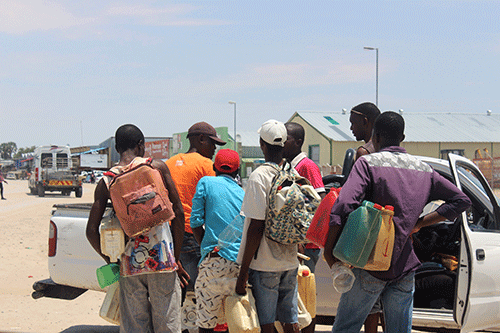Taxi owners were identified as primary consumers of smuggled fuel, thereby resulting in serious economic and security implications for the country. These sentiments were shared last week by Carlo McLeod, deputy director of regulation, compliance and economics in the energy ministry.
According to McLeod, government is faced with a major problem of fuel smuggling from neighbouring Angola. This is particularly evident in the Ohangwena and Omusati regions along the northern borders, which have been identified as regular entry points for smuggled fuel.
After recent record fuel price increases in Namibia, smugglers eyed this as a business opportunity due to the increased profit they were able to secure.
The ministry this month announced a marginal decrease in fuel prices for the month. Petrol prices decreased by 120 cents p/l while diesel prices decreased by 65 cents p/l.
“Despite efforts to revise the Petroleum Products Regulation of 2000, the situation has not improved. Thus, there was a mission undertaken on 10 to 16 July 2022 to investigate the problem in the affected regions to provide recommendations,” McLeod said last week during the ministry’s stakeholder engagement.
Among the findings, McLeod stated there are no delineated border fences, which makes it difficult for law enforcement to maintain control of the situation. He also accused traditional homesteads near the border in both countries of being used to store the smuggled fuel.
“Manpower and transportation are in short supply. This leads officers to use their own vehicles to conduct border operations and the majority of border guards are ageing. Very little effort is being contributed by Angolan police to assist Namibian Police,” he added.
McLeod further stated that some of the law enforcers from both countries are involved in the smuggling of fuel and that current fines and sentences are not deterrent enough.
As part of the recommendations, he said government needs to budget funds specifically for infrastructure, equipment and recruitment of young police border guards. Also stating stiffer fines and heavier sentences would be more of a deterrent.
Angolan nationals who spoke to New Era reporter last week said their smuggling operations have been doing well since they started the illegal trade at Oshikango. They said other crimes dropped in the area because they focus on the lucrative fuel smuggling instead of robbing people.
The Ohangwena region has been identified as a critical area due to its proximity to service stations in Santa Clara, Angola, where the smuggled fuel is sourced, while Onamhinda in Oshikango, which is partially fenced, is ineffective as criminals continue to cut the fence.
Meanwhile, McLeod said the activities have now become a life-threatening concern, not only as an economic issue, as police officers are often attacked by fuel smugglers, resulting in injuries and property damage. In a budget speech in April this year, energy minister Tom Alweendo stated that fuel smuggling has become an increasing trend that has a serious negative impact on the domestic economy.


